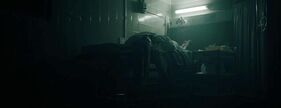In recent years, the films produced by A24 have led a new wave of so-called religious horror : "Night Visit", "A Midsummer Night Before", "Genetic Doom" and "Lighthouse", all giving people a refreshing experience. Different from the traditional bloody scenes and scary techniques, the A24 series of horror genres often use unconventional means to arouse the audience's uneasiness, adding a lot of artistic style and experimentation to the genre level. And the most recent A24 "successful work" is definitely the "Sage Mord" that captured the hearts of many film critics last year . This is the directorial debut of female director Ross Glass , and on the surface, it is still the subject of religious horror that A24 is good at . The story tells the story of a young private nurse while taking care of the patient. They have a good impression of each other, followed by fanatical beliefs and self-destructive ending. The director deliberately blurs the line between religious belief and mental illness, and the scene switches between the illusion of a female nurse and the real scene at will to create a lot of suspense. It is not so much a critique of religious fanatics as it is a psychoanalytic report on lonely women . The heroine is not out of nowhere. The patients she takes care of and the friends around her continue to extend friendly olive branches to her, but she regards this as an evil act. She traps herself in the mistakes she has committed in the past, trying to Religion washes away sins.
In fact, this can be said to be a type of horror that has nothing to do with religion. It is a tragedy caused by the heroine's paranoia. The director deliberately didn't explain clearly the previous situation (medical errors may be only part of the reason), and the script too cleverly used her mental state of hallucinations and a series of physical horror reactions to concoct the effect of horror. This is undoubtedly more advanced than the usual surprises, but this method failed to make this character reach the appeal of the protagonist in De Palma’s classic "Witch Carrie" (the two characters are essentially the same sex). The simple and popular narrative allows the audience to understand the protagonist's behavior without obstacles, but it is difficult to empathize with the character, whether it is sympathy or disgust. Therefore, even if the female newcomer’s performance is amazing, or the scene of her self-immolation ascends to heaven, she is shocked. The lack of a full and three-dimensional character is always a failure, and the result of polarization is inevitable.
View more about Saint Maud reviews











